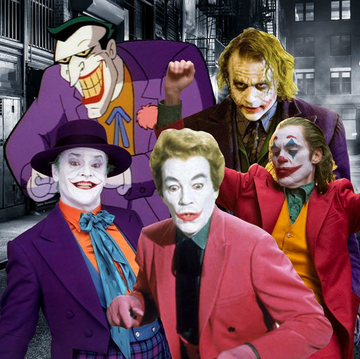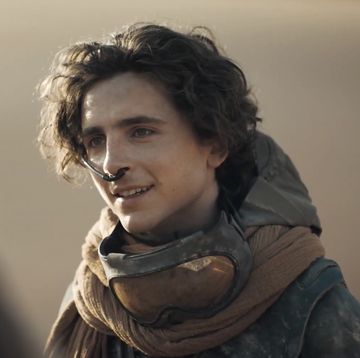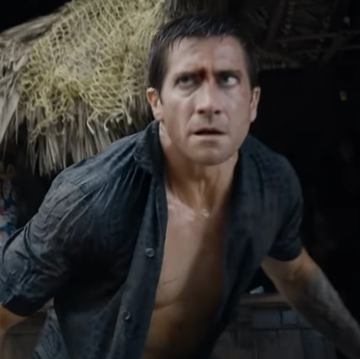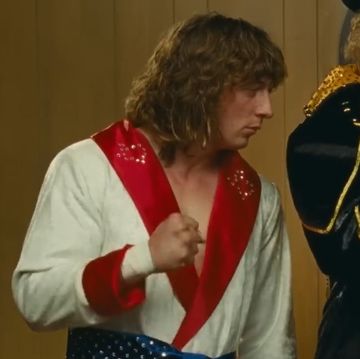At its most elemental level, the buddy-cop movie, in its nearly 40 years of commercial success, is a lesson in problem solving. Two divergent personalities, often forced to work together, must learn to coexist and, ultimately, in the midst of disaster, find a way to cooperate. It is a timeless cinematic trope, comfort food (coffee and donut, perhaps?) that gives the genre its reason for being. But what keeps it going—what makes it remarkably exciting and important, even as it feels rather familiar—is its determined evolution. Since 1967's In the Heat of the Night, the movies have used the police force (and, more specifically, the squad car) as a container to smuggle racial, cultural, and political concerns into the sandbox of comedic car chases and showy shoot-em-ups.
Here's a list of our 10 favorites.
10. The Heat
[youtube ]https://www.youtube.com/watch?v=1O3iRdiplB0[/youtube]
Women in buddy-cop movies are usually reserved for the kitchen or the bedroom. They have a gun pointed at their head or have some white stuff under their nose. Wrinkling the genre with The Heat, writer and director Paul Feig decided to give both X chromosomes some long-deserved badges and confirmed that the blueprint for comedic cop work doesn't solely rely on hopped-up testosterone. Sandra Bullock, varying her Miss Congeniality role, offers a cocky, lonely but scrupulous FBI Agent that learns to tumble with Melissa McCarthy, a street-smart, reckless and, above all, foul-mouthed Boston policewoman. Together they're assigned to take down the leader of a drug cartel and manage to create a new vocabulary—"tattletits," for example—in the process. Feig is careful and clever enough to let the insults fly without being misogynistic. If there is any doubt, consider a scene when McCarthy plays Russian roulette with a criminal's crotch to get some answers. It plays for laughs and levels expectations.
9. Men in Black
Race, age, and biology are all points of contention for Agent J (Will Smith) and Agent K (Tommy Lee Jones) in Men In Black, the secret agent movie from director Barry Sonnenfeld that made us re-think alien life on earth. Fresh off The Fresh Prince of Bel-Air, Smith introduces his character sprinting and sweating his way through a baggy white T-shirt with a badge flopping around his neck. It's a far cry from the suit and tie he eventually learns to wear next to Jones, who's been around the block and would rather not deal with his new partner's antics. Together they investigate a cockroach-like alien trying to take back the galaxy that's inhabiting Vincent D'Onofrio's body. Smith's trigger-happy style doesn't jive well with M.I.B.'s need to cover up intergalactic war on a consistent basis, but after a slimy showdown in Queens, this one's hard to forget—even after a memory neuralyzer.
8. 21 Jump Street
Jenko and Schmidt were complete opposites in high school: one a chiseled, dumb jock, the other a brace-faced nerd. That they are played by Channing Tatum and Jonah Hill, respectively, only enhances this distinction. But seven years later, now police officers posing as teenagers to infiltrate a high school drug ring, roles are reversed. 21 Jump Street imagines Hill sitting with the popular crowd and Tatum geeking out about covalent bonds. "I don't get this school," says Tatum, working to upend the stereotypes he helped reinforce years before. Most of the humor comes from this meta-conceit. Both get lost in character—the mission is a second chance at high school; to be cool, to get good grades—until their police chief, played by a wonderfully volatile Ice Cube, reminds them of their duties. Directors Phil Lord and Christopher Miller prove that science class and prom night can blend seamlessly with a barrage of bullets.
7. The Other Guys
Functioning as both a premonition for director Adam McKay's eventual leap into attacking the financial industry in The Big Short—and the next step in his relationship with crude comedy—The Other Guys cranks up the crazy in the word cop. Flipping expectations—Will Ferrell plays an uptight, anxious secretarial officer, Mark Wahlberg is a testosterone-injected "peacock" waiting to fly—McKay bottles up an ideal personality war. Each has some regretful histories (they include Derek Jeter and the name "Gator"), vulnerabilities that bring them closer during a case that starts with a scaffolding permit violation and ends with an attempt to stop a pension fund scandal. In between, The Other Guys puts some big-boy pants on the genre and won't let you forget how oblivious Michael Keaton is to TLC songs.
6. Rush Hour
Blending Kung Fu with the detective procedural, Brett Ratner's Rush Hour offered some acrobatics to the tried and true tropes of the genre. Here, Chris Tucker plays overconfident LAPD officer Carter, who tag-teams with Jackie Chan, a Hong Kong policeman known as Inspector Lee, to rescue the Chinese Consul's kidnapped daughter. Conflict arises with language barriers—Chan is learning English, Tucker is abusing it—but smoothes when their cultural contrasts begin overlapping. Both prefer to work alone, but realize (around the time Chan begins singing Edwin Star's "War") that sharing their skillsets might prove mutually beneficial. Lee teaches Carter how to steal a pistol; Carter teaches Lee how to wave one. This could have been a cruel farce harboring racist contrivances. Instead, the international mismatches learn to respect each other, which spawned Hollywood stardom and two more sequels.
5. Training Day
Director Antoine Fuqua provides the atmosphere. Denzel Washington provides the manic energy. Ethan Hawke provides the moral sanity. But it's writer David Ayer that provides the twist to the genre. Defying conventions, he penned a script committed to its predecessors while inversing their harmonious endings. Sprawling the saturated narcotics underbelly of Los Angeles, Washington takes Hawke under his tutelage (and gunpoint), teaching (forcing) him to be a wolf, not a sheep, which punctures his ethics and warps his reality. The relationship starts with nervous speculation and ends with a rooftop brawl; Washington's crooked cop becomes a thieving zigzag with professorial gusto. "This shit's chess, it ain't checkers," he barks about his livelihood. Hawke refuses to be his pawn and in doing so refuses to fit inside a formulaic finale.
4. 48 Hrs.
I saw Purple Rain recently in theaters to commemorate Prince's untimely passing, and besides the incredible music videos that populate most of the running time, it's a much darker movie than you probably remember. There's domestic violence, attempted suicide, a woman being thrown into a dumpster. It came out in 1984, two years after Walter Hill's 48 Hrs., the foundational buddy-cop movie that pitted Nick Nolte with Eddie Murphy, which also strays darker than you probably remember (racial tension via the N-word swerves through a dangerous San Francisco). Nolte is on the hunt for a cop-killer and unwillingly gives Murphy—the killer's former associate and a current convict—48 hours leave to help find him. They argue a lot in between. The comedy comes from the characters, not the punch lines. "You're going to be sorry you met me," each tells the other. "I already am sorry," each replies. Eventually they cooperate under fire, creating the friction-filled blueprint for the genre.
3. End of Watch
David Ayer earned critical acclaim in his jump to the director's chair for one of the most authentic portrayals of LAPD life. Using GoPros to enhance the immediacy and intimacy (and to kick-start the plot) of two partners' daily excursions, Ayer captures the unique bonds that get shaped in the line of duty. The movie isn't written with plot or comedy in mind, but the rapport between Jake Gyllenhaal and Michael Pena as cocky officers Taylor and Zavala sustains a movie intent on exploring L.A's neighbor wars and the confined, intense and often comical police relationships from the view of a dashboard cam. Conversations and vignettes (including some with Anna Kendrick) only feed the inevitable tearjerker of an ending when the pair's curiosity places them in the crosshairs.
2. Hot Fuzz
From the opening montage—a cinematic term that has been revolutionized with visual wit by its director Edgar Wright—Hot Fuzz establishes that Simon Pegg, playing an overachieving officer Nicolas Angel, takes his job extremely seriously. But, of course, this characteristic makes him loathed around the office, so that when his London inspector suddenly tells him he's been re-assigned to a small countryside village, they can't wait to say goodbye. When he arrives in quaint Sandford, he's partnered with a dimwit named Frank Butterman (Nick Frost), who has an immense affection for buddy-cop movies, and learns his job requirements now include capturing runaway swans. Quickly Butterman becomes an asset once Angel discovers a large conspiracy regarding the deaths of several members of the community. The second of the Cornetto Trilogy, Hot Fuzz is Wright's sharpest and most satisfying satire to date.
1. Lethal Weapon
Lethal Weapon takes the torch from 48 Hrs. and ignites its flame, which is to say it perfects and exaggerates the jagged conflict between two detectives and fits them perfectly together. Danny Glover plays Murtaugh, who is introduced returning home after work on his birthday to his family and some cake. Mel Gibson plays Riggs, who wakes up in a trailer, gulps a beer for breakfast and flirts with a gun in his mouth. Murtaugh is a tired professional. Riggs is a jumpy suicidal. Naturally, the chief puts them together to chase some high-level drug smugglers (including a slick-haired Gary Busey) and they learn to bond over bullets and Christmas dinner. Under director Richard Donner, the movie became the stencil for future iterations (see all the above), and its own three sequels. "I'm getting too old for this shit," Glover says multiple times, a line that quickly became iconic. The irony is you'd never use it to describe watching this movie.













